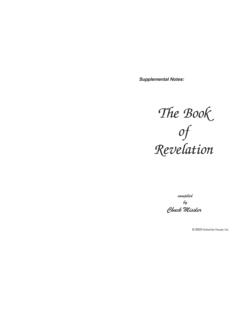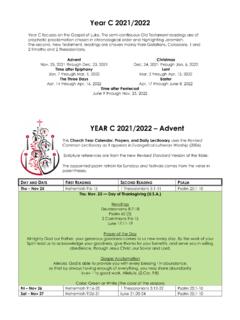Transcription of Notes on Revelation - Plano Bible Chapel
1 Copyright 2021 by Thomas L. Constable Notes on Revelation 2021 Edition Dr. Thomas L. Constable HISTORICAL BACKGROUND The opening verses of the book state that "John" wrote it (1:1, 4, 9; cf. 22:8). From the first century to the present day, almost all orthodox scholars have concluded that this means the Apostle Two noteworthy exceptions were Luther and Zwingli. Today, many scholars who accept the divine inspiration of the book believe the Apostle John wrote it. Others, of course, believe some other "John" wrote the Some of the early church fathers (Clement of Alexandria, Eusebius, Irenaeus, and Victorinus) wrote that the Apostle John experienced exile on the island of Patmos during Domitian's reign (1:9).3 They wrote that the government allowed John to return to Ephesus after Emperor Domitian's death in 96. Consequently, many conservative interpreters date the writing of this book near 95 or There is good evidence that this 1 See Robert L.
2 Thomas, Revelation 1 7: An Exegetical Commentary, pp. 2-19; John F. Walvoord, The Revelation of jesus christ , pp. 11-14; or Donald A. Carson and Douglas J. Moo, An Introduction to the New Testament, pp. 700-7, for further discussion of authorship. , David E. Aune, Revelation 1 5, p. lvi; William Barclay, The Revelation of John, 1:15; James Moffatt, "The Revelation of St. John the Divine," in The Expositor's Greek Testament, 5:320-27. 3 See the map near my comments on 1:10-11. For a summary of this tradition, see Isbon T. Beckwith The Apocalypse of John, pp. 366-93; George Eldon Ladd, A Commentary on the Revelation of John, p. 8; and Raymond E. Brown, The Gospel According to John, 1:lxxxviii-xcii. , Carson and Moo, pp. 707-12; Barclay, 1:17; Moffatt, 5:327; A. T. Robertson, Word Pictures in the New Testament, 6:274, 343; Robert Jamieson, A.
3 R. Fausset, and David Brown, Commentary Practical and Explanatory on the Whole Bible , p. 1531; Arno C. Gaebelein, The Annotated Bible , 4:2:192; Richard C. H. Lenski, The Interpretation of St. John's Revelation , p. 5; John F. Walvoord, " Revelation ," in The Bible Knowledge 2 Dr. Constable's Notes on Revelation 2021 Edition was the last of John's inspired Kenneth Gentry argued that John wrote Revelation in the late Several writers have refuted this preterist "Perhaps more than any other book in the NT, the Apocalypse enjoyed wide distribution and early recognition."4 Where did John get "the Revelation " that he wrote down in this book? He said that he received it from jesus christ through angelic mediation (1:1). Most of the details of this Revelation were undoubtedly new to John. However, there are remarkable parallels between this Revelation and the Lord jesus ' teaching in the Olivet Discourse (Matt.)
4 24 25; Mark 13; Luke 21). The Book of Revelation clearly builds on that foundation and expounds The apocalyptic sections of certain books of the Old Testament particularly Daniel, Isaiah, Ezekiel, and Psalms contain former Revelation that God gave His prophets about the end times. "An apocalypse was the word for a crisis, and for a crisis which bordered on the end."6 John also alluded often to Exodus, Deuteronomy, Jeremiah, and Zechariah. One scholar claimed that 278 of the 404 verses in Revelation contain references to the Old William Barclay claimed that John quoted or alluded to the Old Testament 245 times, citing about 20 Old Testament books his favorites being: Isaiah, Daniel, Ezekiel, Psalms, Exodus, Commentary: New Testament, p 925; Kenneth G. Hanna, From Gospels to Glory, p. 484. See also Aune, p. lxix. 1 See Lenski, pp.
5 6-7. 2 Kenneth L. Gentry Jr., Before Jerusalem Fell: Dating the Book of Revelation . For arguments favoring a preterist-idealist interpretation, see John Noe, "An Exegetical Basis for a Preterist-Idealist Understanding of the Book of Revelation ," Journal of the Evangelical Theological Society 49:4 (December 2006):767-96. , Robert L. Thomas, Evangelical Hermeneutics, pp. 451-71; and Mark L. Hitchcock, "A Defense of the Domitianic Date of the Book of Revelation " ( dissertation, Dallas Theological Seminary), 2005. 4 Robert H. Mounce, The Book of Revelation , p. 36. 5 See Alan Johnson, " Revelation ," in Hebrews- Revelation , vol. 12 of The Expositor's Bible Commentary, p. 402; Austin Farrer, The Revelation of St. John the Divine, pp. 31-32; Henry B. Swete, The Apocalypse of St. John, pp. cli-clii; Beckwith, pp. 139-40; and Louis A.
6 Vos, The Synoptic Traditions in the Apocalypse. 6 Moffatt, 5:295. See Hanna, pp. 485-88, for a discussion of the apocalyptic character of Revelation . 7 Swete, p. cxxxv. 2021 Edition Dr. Constable's Notes on Revelation 3 Jeremiah, and The United Bible Society's Greek New Testament lists over 500 Old Testament Despite all these allusions, however, there are no formal quotations from the Old Testament. The Revelation that jesus gave in the Olivet Discourse and later to John on Patmos supplements that earlier Revelation . " jesus in His [Olivet] discourse was clearly anticipating what He was to show John in much greater detail more than six decades later here on the island of Patmos."3 INTERPRETATIONS There have been four basic interpretations of Revelation throughout church Of course, there are additional variations within these four.
7 "The basic hermeneutical problem in Revelation is determining what is symbolic and what is The idealist, or allegorical, interpretation sees the book as an allegory, teaching the ideal of the triumph of good over evil. Antichrist, in this view, is not a real person, but the personification of evil. In an allegory, there is no historical basis for the story; it is fiction (cf. Pilgrim's Progress). This view has appealed to few interpreters who have a high view of inspiration. Most of its advocates are quite liberal in their theology, and are mainly postmillennial or amillennial in their The preterist interpretation, after the Latin word preater, meaning "past," views the book as dealing only with events in the early history of the 1 Barclay, 1:14. 2 Second edition, pp. 897-920. See Gregory K. Beale, The Book of Revelation , for many allusions to the Old Testament, and Merrill C.
8 Tenney, Interpreting Revelation , p. 104, for charts of the distribution of these in the Old Testament. 3 Thomas, Revelation 1 7, pp. 53-54. 4 See Wilbur M. Smith, " Revelation ," in The Wycliffe Bible Commentary, pp. 1497-1500, for an excellent, slightly longer explanation of these views; or Tenney, pp. 135-46; or Hanna, pp. 488-90. See Thomas Ice, "Back to the Future: Keeping the Future in the Future," in When the Trumpet Sounds, pp. 13-16, for the historical development of these four positions. 5 Robert Vacendak, "The Revelation of jesus christ ," in The Grace New Testament Commentary, 2:1250. 6 See Tenney, pp. 147-67; or Hanna, pp. 490-92, for discussions of millennial views. 4 Dr. Constable's Notes on Revelation 2021 Edition church, specifically: its conflicts with Judaism and paganism in John's day. Advocates often identify "Antichrist" as a past Roman emperor, but there is much difference of opinion about which one.
9 The advocates of this view are mainly postmillennialists and amillennialists. The main problem with this view is the inability of its advocates to unite on the identifications of the various people and symbols that appear in the book. Also, 1:19 says the book points ahead as well as back, and not just to the present (early church era). The historicist view understands Revelation to be dealing with events in the total history of the church, not just the church until John's day. Many advocates identify "Antichrist" with one of the medieval popes, but they do not agree on which one. Advocates are mainly postmillennialists and amillennialists, though some premillennial commentators also held this The main weakness of this view is the interpreters' inability to identify everything predicted in the book with past events and people.
10 The futurist view sees the book describing mainly events in the eschatological future, specifically: the things described in chapters 4 22. "Antichrist," according to this view, is a person who will appear in the future from our present perspective in history. Advocates of this view are mainly premillennialists. The main problem with this view is its "improbability," at least from the viewpoint of its critics. Another problem is that it requires more literal interpretation, and belief in the supernatural, which some interpreters are uncomfortable with. This view makes the most sense of the book to me. By the way, I am a premillennialist, not because I am a graduate of Dallas Theological Seminary, but because premillennial interpretations of various New Testament passages make the most sense to me. In other words, exegesis, rather than theology, is the basis for my J.



